Today SevenPonds speaks with Jeff Harbeson, the CEO of CG Labs in Ontario, Canada, and the founder of Family Choice Funerals and Cremations, a Virginia-based company with a vision of becoming the only six sigma operating platform and franchise funeral home model in the United States. The Harbeson Group’s innovative spirit is founded on the principle of providing the consumers with all the information needed to make an educated funeral decision. Combining his military and business expertise, Jeff’s entrepreneurial spirit puts him in the forefront of funeral and DNA markets, while his funeral blog, The Funeral Commander offers a distinct view of the funeral industry based on Jeff’s own extensive experience in the field. Today Jeff is discussing the history of the DNA Memorial, giving an overview of the DNA storing process and explaining the benefits of preserving the family DNA.
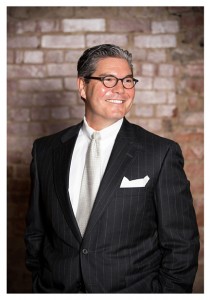
Jeff Harbeson
(Credit: Calebwilde.com)
Julie: First of all, how did you become introduced to the field of funeral industry?
Jeff: After 20 years in the military, I got recruited by a casket company. Since then I’ve developed two funeral homes from the ground up, that provided me the platform to assist developing DNA Memorial for use and distribution to the funeral industry. As a funeral professional, I realized that offering to collect DNA from a deceased person would be a tremendous value to those left behind. I believe that funeral directors have an obligation to share information to consumers that cremation is irreversible; the cremation process destroys DNA, and after burial, disinterment is costly emotionally and financially. That is why I am working to grow DNA Memorial in the funeral service industry. I’m a true funeral service entrepreneur.
Julie: What sparked the idea of a DNA Memorial?
Jeff: Our family has a history of ALS (Lou Gehrig’s disease). My wife’s uncle is the professional baseball player and Hall of Famer Jim “Catfish” Hunter. Jim died in 1999 as a result of complications of ALS and in 2006, my wife’s first cousin Gary Hunter died of ALS as well. My wife and our 2 sons have the same bloodline, and I realized that neither Jim nor Gary’s DNA (genetic record) are available after their respective deaths for any genome sequencing. In February, this year, researchers have identified a new gene that is associated with Lou Gehrig’s disease, which is another reason that DNA research is important.
“It may not seem important today, but in 16 years, your daughter may find out she has a genetic disease, and if we have a genetic sample, we can monitor her DNA. We’re seeing every day that medical research is advancing.” — Jeff Harbeson
Julie: How do you preserve your samples?
Jeff: We have created a proprietary process of extracting DNA from a non-invasive mouth swab or body hair sample, binding the DNA to a substrate, which can be stored/banked at room temperature indefinitely. Basically, we have created a process that consumers may keep a sample of their own (or deceased loved one’s) DNA securely at home.
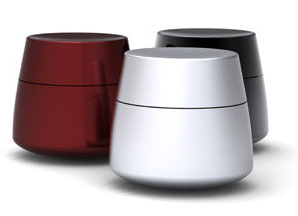
DNA Vial
(Credit: DNAmemorial.com)
Julie: What are the benefits of storing DNA?
Jeff: The more the family has of its own information, the better off they are. Angelina Jolie is a good example. Her mother died of breast cancer, but Angelina had a sample of her DNA, and was able to monitor her own. Physicians surmised that she had an 87% chance of contracting breast cancer. When her own cancer gene, BRCA1, was mutating to the same extent as her mother’s — remember that it’s the mutation rates that are measured — she was able to take preventative measures.
Julie: How does storing DNA help prevent genetic disorders in the future?
Jeff: Every time we visit a doctor, one of the first questions is about family history. It may not seem important today, but in 16 years, your daughter may find out she has a genetic disease and, if you have a genetic record from various family members, medical professionals can monitor her DNA. We’re seeing every day that medical research is advancing.
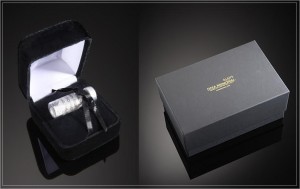
DNA Home Banking Vial
Credit: DNAmemorialuk.com
Julie: Is disease prevention the main reason for your clients’ storing of DNA?
Jeff: Our customers are particularly interested in the medical aspects of preserving genetic records. When you go to a doctor, the first thing that the doctor will ask is “what is your medical history?” In the future, this question may become superfluous.
Julie: How are the DNA Memorial samples stored?
Jeff: They are stored at a lab facility in Thunder Bay, Ontario. Canada has some of the strictest privacy laws about DNA in the world. However, ninety percent of people keep it at home. The consumers have their own access. In essence, you are personally protecting the DNA of your loved one.
Julie: Are there any legal issues?
Jeff: In the US, nothing bars consumers from keeping or banking DNA in their home.
“I believe that funeral directors have an obligation to share information to consumers that cremation is irreversible; the cremation process destroys DNA…” — Jeff Harbeson
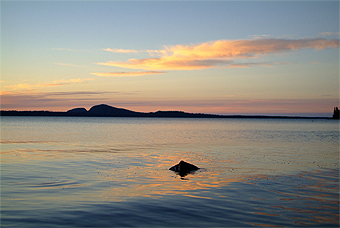
Thunder Bay, Ontario
(Credit: CGLabscorp.com)
Julie: I remember a few years ago there was a lot of concern about insurance companies and DNA.
Jeff: If insurance companies bank and store DNA, they can say, “We see you have a propensity for disease,” and deny insurance. We do not test the DNA for genealogical or medical purposes; we simply provide a sample with long term banking for future testing. Our secure facility banking and customer security process prevents any agency, whether governmental or insurance-based to access to your loved one’s DNA. More importantly, our Home Banking allows for personal safe storage and safe keeping.
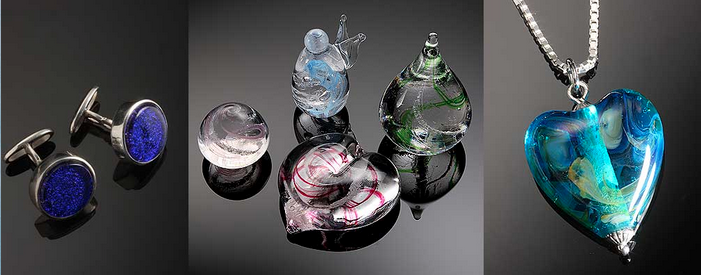
Keepsakes containing the DNA of a loved one
(Credit: DNAmemorialuk.com)
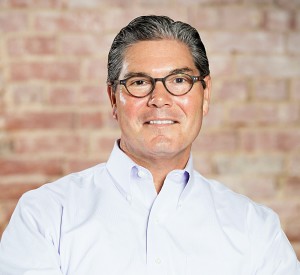
Jeff Harbeson
(Credit: Myfunteralfinance.com)
Julie: Can I get a sample while I’m still alive, and how is it done?
Jeff: If you wanted to have your own DNA, we can send you a kit. It’s a non-invasive process using two cheek-swabs and 10-15 hair samples with bulbs. We’re also creating a new brand — Babystpot.ca — that provides a new child ID opportunity for parents and is available on the Secure My DNA site under Secure Child DNA tab.
Julie: Why can’t we just store DNA from lock of hair, for example, instead of using your services?
Jeff: If you store your own DNA, what you are storing is Mitochondrial DNA that says, ‘I’m Julie,’ for example. DNA in itself is a long strand of indiscriminate letters that are all in one sentence that are very fragile and can break down over time. After two years from now, we could say, ‘It’s Julie,” but we can’t say who Julie was. Our process allows DNA to stay in its purest form.
“We want to say, ‘Hey look, consumer, before your loved one is cremated, consider that you may also be destroying important info.’ ” — Jeff Harbeson

Secure Child DNA offers parents the custody of the child’s DNA
(Credit: DNAmemorialorder.com)
Julie: Why can I order a kit if I’m still alive, but to order a kit for a dead loved one, I have to go through a funeral service provider?
Jeff: A funeral service provider will most likely be in possession of the body at their embalming room in the funeral home. For safety reasons (biohazards, etc.), funeral directors are the most suitable for taking samples from the deceased. A consumer may order a kit from us direct and ask a funeral director to take the sample.
Julie: DNA memorial sounds like a very interesting idea. Why don’t all funeral businesses offer it?
Jeff: Funeral industry is a very closed industry. Even though they can financially benefit from it, they don’t like to do anything different. I just gave a speech ‘DNA is Alive in the Death Industry.’ We are spending as much time talking to consumers about our services as we do to funeral directors.
Julie: Why is it important for funeral homes to offer this service?
Jeff: Cremation process is irreversible. When we cremate a body, DNA is lost and destroyed. That is very significant when family cremates a loved one – their genetic info is destroyed forever. We want to say, ‘Hey look, consumer, before your loved one is cremated, consider that you may also be destroying important info.’
Julie: Because of pop culture influence, one of the first things that came to my mind was: what if these DNA samples are used in the future for cloning?
Jeff: So far we had no one who has breached this subject.

DNA Home Banking Vial
(Credit: DNAmemorialuk.com)
Julie: You also offer memorial products, portraits and jewelry as part of your services. How do you incorporate DNA into these items?
Jeff: What we have the ability to do is we can take a portion of the DNA from the preserved sample and use it in the keepsake. Our first piece of jewelry was ordered by a woman from Ireland for her nine-year-old daughter who had died. She purchased a vial and a keepsake and was able to keep a part of her daughter close to her by wearing the jewelry, and use the DNA sample for her other daughter to monitor the same disease.
Julie: Can a sample be extracted from a keepsake too?
Jeff: You cannot extract from a keepsake, however with every piece of jewelry or a keepsake, the consumer receives a Home Banking sample as well.
My loved one has moved on, but the DNA is alive in this capsule. How important is it that their genetic record (DNA) is still alive? — Jeff Harbeson
Julie: How can this process change people’s view of death?
Jeff: That’s a question you can ask yourself. My loved one has moved on, but the DNA is alive in this capsule. How important is it that their genetic record (DNA) is still alive?
Julie: Jeff, thank you very much for your time.
Jeff: Thank you!

 What is DNA Banking? An Interview with Jeff Harbeson, Part One
What is DNA Banking? An Interview with Jeff Harbeson, Part One


 How Dare You Die Now!
How Dare You Die Now!
 Debating Medical Aid in Dying
Debating Medical Aid in Dying
 “Help Me, Helen”
“Help Me, Helen”














